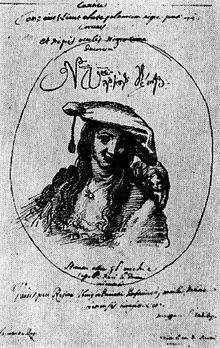Darejan of Kakheti, Queen of Imereti
| Darejan of Kakheti | |
|---|---|

Darejan, Queen of Imereti. A sketch by the contemporary Italian missionary Cristoforo Castelli.
|
|
| Queen consort of Imereti | |
| Tenure | 1639–1660 1661–1663 1668 |
| Born | c. 1615 |
| Died | 1668 |
| Burial | Gelati Monastery prev. Church of All Saints, Kutaisi |
| Spouse |
Zurab, Duke of Aragvi Alexander III of Imereti Vakhtang of Imereti |
| Issue | Leonti |
| Dynasty | Bagrationi |
| Father | Teimuraz I of Kakheti |
| Mother | Khorashan of Kartli |
| Religion | Georgian Orthodox Church |
Darejan (Georgian: დარეჯანი) or Nestan-Darejan (ნესტან-დარეჯანი) (c. 1615 – 1668) was a daughter of King Teimuraz I, a ruler of Kakheti in eastern Georgia, with a notable role in the contemporary politics of Georgia. Her three marriages represented a component of her family's and her own political machinations. Her first husband, Zurab, Duke of Aragvi, was put to death at the behest of Darejan's father in 1630. Her second and third marriages, to Alexander III and Vakhtang I, respectively in 1630 and 1661, made her a queen consort of Imereti, in western Georgia, where Darejan became embroiled in a series coups and counter-coups. She was eventually murdered by members of the rival party in Kutaisi.
Darejan was a daughter of Teimuraz I of Kakheti and his second wife Khorashan, a sister of the neighboring Georgian monarch, Luarsab II of Kartli. In 1623, Teimuraz married off Darejan to his influential vassal, Zurab, Duke of Aragvi, in spite of the protests from Queen Khorashan, who blamed Zurab's family for many misfortunes that had befallen on her native Kartli. The marriage secured Zurab's support to Teimuraz against the warlord Giorgi Saakadze, in 1626, although Saakadze was himself married to Zurab's sister. Rid of Saakadze, Teimuraz then instigated Zurab to assassinate the rival pro-Persian ruler Simon II of Kartli in 1630, but he soon began to suspect Zurab of regal ambitions. Teimuraz invited his son-in-law to dinner and had him beheaded. He then sent Zurab's severed head to the Persian shah Safi to prove his loyalty and to maintain his innocence in Simon II's death.
...
Wikipedia
